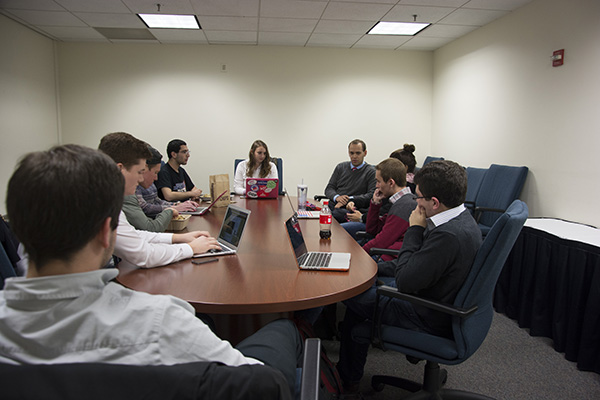The president of GW College Republicans said news coverage of big-name Republican politicos often leaves the public feeling like the party isn’t one to lend a helping hand.
Alex Pollack cited Democratic National Committee Chairwoman Debbie Wasserman Schultz’s accusation in September that Wisconsin Gov. Scott Walker was “grabbing women by the hair and holding them back,” which he said turned off some people from conservative politicians.
But the organization’s top leader is looking to revamp his chapter’s reputation for not necessarily being service-oriented, hoping to distance the group from stigmas that he said has plagued its national counterparts.
“Republicans care. We’re a compassionate party and we need to be stronger with our emotional message,” Pollack said.
Pollack ran for his position last spring on a platform to expand the organization’s community service work, including adding a community service director to its executive board.
Pollack said he wants to see the College Republicans get involved with clothing drives, as well as food banks and soup kitchens. The group plans to schedule events within walking distance of the Foggy Bottom Campus to encourage the most participation and cut costs.
One of the first events will be a GW College Republicans-sponsored blood drive with the American Red Cross, the new director Sabrina Rush said. A sophomore majoring in international affairs, she said the Republican Party should publicize its charity efforts.
Rush said she doesn’t believe that Republicans have a reputation for being the less compassionate political party, citing the service-oriented conservative values that she experienced growing up in Georgia. But she said that community service is an activity that everyone should do more.
“We just want to serve the greatest need that there is, not pushing any kind of conservative agenda. We don’t want to turn anyone away from serving with us,” Rush said.
In the past, the student organization has focused its charitable work on donation drives and laying wreaths at Arlington Cemetery, but Pollack said he wants the group perform more active, hands-on volunteer work, in addition to making donations.
Chandler Thornton, the state federation chair for all D.C. College Republican organizations, said more chapters nationwide are trying to focus on philanthropy. Thornton, who is a senior at American University, pointed to his school’s College Republicans chapter, which has been involved with Relay For Life and the Capital Area Food Bank for several years.
“In the last six or eight years we’ve seen the College Republicans go from just gathering for political reasons to [being] an organization of students with like-minded beliefs gathering for other reasons like community service,” Thornton said. “It’s a huge part of what we do right up there with campaign trips and other events we put on.”
Thornton said he sees focusing more on charity as “a very conservative ideal.”
“It’s people in the community coming together to help out people that are unfortunate as opposed to the government pushing entitlements,” he said. “Community service is a conservative ideal, and I think that’s why it’s been a really successful initiative [within our party].”
GW political science professor John Sides said while public opinion tends to favor Democrats when it comes to “being good for the interests of needy people,” he doesn’t believe any party acts more charitably than another.
Sides has written about the GOP’s branding problem in the past, arguing that Republicans have experienced an “empathy gap” for some time. He said “correctly or not,” the Democratic Party is perceived as doing more to help the poor and working class, while the Republican Party is associated with the wealthy or upper class.
“These perceptions of the parties likely grow out of the two parties’ policy agendas dating back to the New Deal,” Sides said. “Citizens gain a sense of ‘who parties want to help’ based on perceptions of the policies each party sponsors.”








